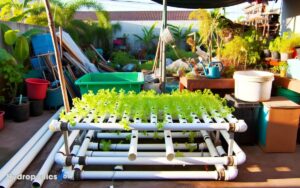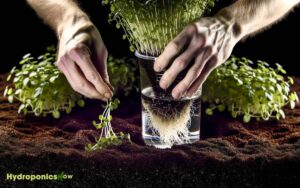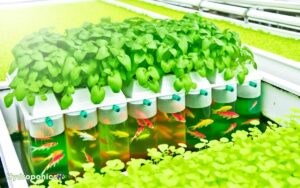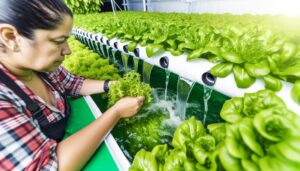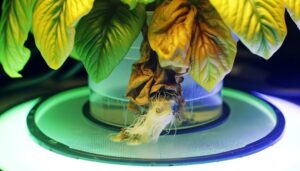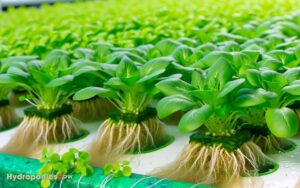Do Hydroponic Plants Taste Different?
Yes, hydroponic plants can taste different from soil-grown ones. They grow in a nutrient-rich solution where essential minerals are precisely controlled. This impacts their flavor profiles.
For instance, higher potassium levels can enhance sweetness in fruits. Additionally, controlled light, temperature, and water quality create consistent, high-quality flavors.
Hydroponic plants also show increased crispiness and firmness due to ideal cell turgor. The absence of soil-borne pathogens guarantees purity, leading to fresher and more uniform textures.
By focusing on specific nutrient delivery and environmental conditions, you can achieve superior tastes and textures. To explore more details, there’s a wealth of information available.
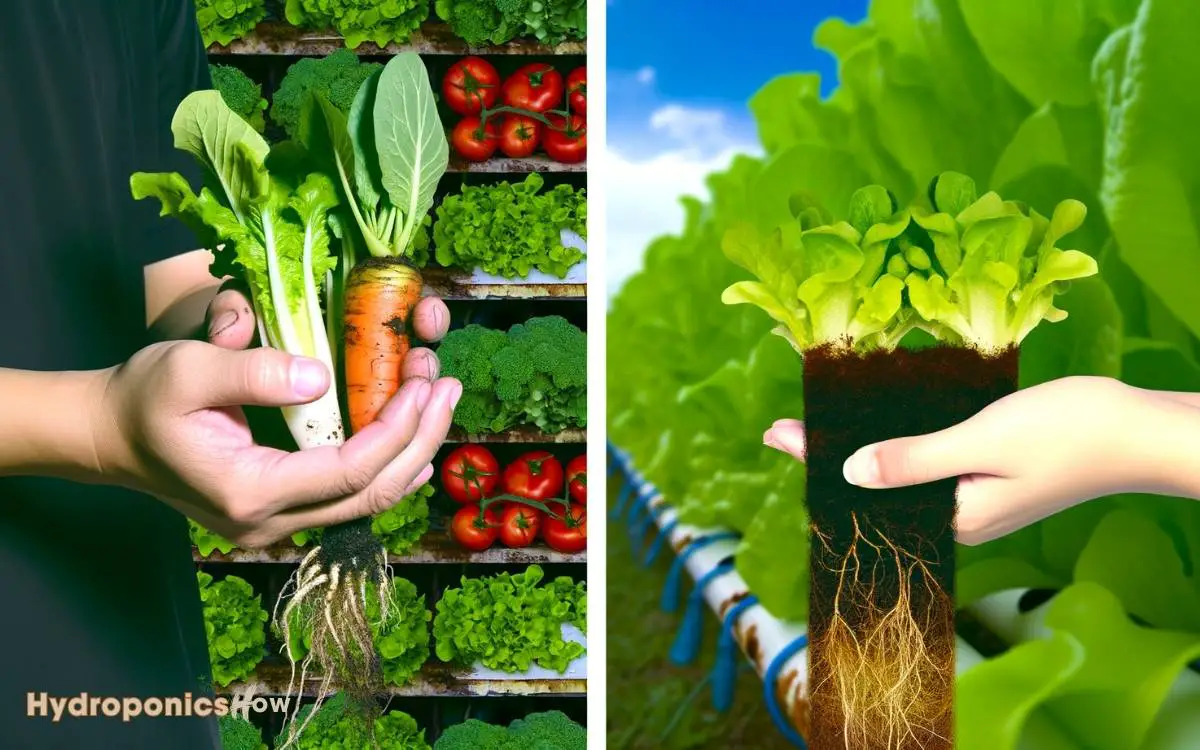
Key Takeaways
Understanding Hydroponics
What exactly is hydroponics, and how does it differ from traditional soil-based agriculture?
In hydroponics, plants grow in a nutrient-rich solution instead of soil. This technique allows you to control pH levels, nutrient concentration, and oxygen supply more precisely.
Unlike conventional methods, hydroponics increases growth rates and yields by directly providing essential nutrients to plant roots.
Studies show that hydroponic systems use up to 90% less water compared to soil farming and eliminate the need for pesticides due to fewer pest issues. Additionally, you can grow plants year-round indoors, independent of climate conditions.
This method offers a sustainable alternative to traditional agriculture, reducing water consumption and land use while maximizing efficiency.
Flavor Factors in Plants
You’ll find that flavor in plants is greatly influenced by the nutrient solution they receive and their environmental conditions. Studies indicate that hydroponic systems can precisely control these factors, potentially altering taste profiles.
Understanding these elements is essential for evaluating whether hydroponic plants taste different from soil-grown counterparts.
Nutrient Solution Impact
The composition of the nutrient solution in hydroponic systems greatly influences the flavor profile of the plants.
You’ll find that nutrient solutions are carefully calibrated to contain essential minerals like nitrogen, potassium, and calcium. These nutrients directly impact the plant’s metabolic processes, affecting the synthesis of flavor compounds.
For instance, higher potassium levels can enhance sweetness in fruits, while nitrogen influences amino acid content, altering taste.
Studies show that precise control over nutrient ratios can lead to more consistent and desirable flavors compared to soil-grown counterparts. However, the exact impact can vary based on plant species and growth stage.
Hence, understanding and fine-tuning nutrient solutions is important for optimizing flavor in hydroponic cultivation.
Environmental Conditions Effects
How do environmental conditions in hydroponic systems influence the flavor profile of plants?
Temperature, humidity, and light intensity directly affect plant metabolism, impacting flavor compounds. In hydroponic systems, you can precisely control these variables, optimizing conditions for desired taste profiles.
Studies indicate that higher light intensity can enhance the synthesis of secondary metabolites like flavonoids, affecting taste.
Similarly, controlled temperatures can prevent stress-related bitter compounds. Relative humidity also plays a role; maintaining ideal levels guarantees better nutrient uptake, which can influence flavor.
Evidence suggests that such environmental control leads to consistent, high-quality flavors in hydroponically grown plants.
Therefore, understanding and managing these conditions is essential for achieving specific taste characteristics in hydroponic produce.
Nutrient Absorption Differences
Nutrient absorption in hydroponic plants can markedly differ from soil-grown plants due to the direct availability of essential minerals in the water solution.
This method provides plants with a controlled environment where nutrients are readily accessible, potentially influencing their flavor profile.
You’ll notice that hydroponic systems offer:
- Precision: Exact nutrient dosages tailored to plant needs.
- Consistency: Uniform nutrient distribution, reducing variability.
- Efficiency: Faster nutrient uptake leading to quicker growth cycles.
- Purity: Absence of soil-borne pathogens and contaminants.
Research suggests that these factors can lead to variations in nutrient composition, which may affect taste.
Hydroponically grown plants often absorb minerals like nitrogen, phosphorus, and potassium more efficiently, potentially altering their biochemical makeup and, consequently, their flavor.
Texture Comparisons
When comparing hydroponic plants to soil-grown counterparts, you’ll notice differences in texture, such as crispiness and firmness.
Studies show that hydroponic methods can enhance juiciness and freshness due to controlled water and nutrient delivery.
Additionally, the tenderness and bite of these plants can vary, with some evidence suggesting a more consistent texture profile in hydroponically grown produce.
Crispiness and Firmness
Hydroponic plants often exhibit a crispiness and firmness that can be attributed to the controlled water and nutrient delivery systems in hydroponic setups.
This precise control allows plants to develop ideal cell structure, resulting in:
- Enhanced cell turgor: Guarantees cells are firm and full of water.
- Consistent nutrient availability: Leads to uniform growth and texture.
- Reduced mechanical stress: Plants aren’t subjected to soil compaction.
- Ideal oxygenation: Root systems receive adequate oxygen, promoting healthy growth.
These factors collectively contribute to the superior texture often observed in hydroponic produce.
By maintaining perfect growing conditions, hydroponic systems can produce vegetables and fruits that are consistently crisp and firm.
This ensures that when you bite into hydroponically grown produce, you experience a satisfying crunch and firmness every time.
Juiciness and Freshness
When it comes to juiciness and freshness, hydroponic plants often exhibit superior moisture retention and a just-picked quality due to the optimized environmental conditions in which they’re grown.
Studies have shown that hydroponic systems allow for precise control over water and nutrient delivery, enhancing the plant’s hydration levels. This results in a juicier and fresher product when compared to soil-grown counterparts.
| Characteristic | Hydroponic | Soil-Based |
|---|---|---|
| Moisture Level | Higher | Variable |
| Freshness | Consistently High | Fluctuates |
| Nutrient Intake | Optimized | Soil-Dependent |
| Growth Rate | Faster | Slower |
| Harvest Timing | More Predictable | Less Predictable |
Tenderness and Bite
Precision in environmental control leads to hydroponic plants often exhibiting a more consistent texture, characterized by enhanced tenderness and a satisfying bite.
This consistency stems from the ability to fine-tune nutrients, water, and light, which directly impacts cell structure and growth patterns.
Studies show that hydroponic plants typically present:
- Essential cell wall development: Ensuring uniform tenderness.
- Controlled water uptake: Preventing over- or under-hydration, vital for achieving the ideal bite.
- Balanced nutrient absorption: Promoting ideal tissue firmness.
- Reduced mechanical stress: Minimizing damage that could affect texture.
You’ll notice these characteristics provide a reliable eating experience, making hydroponic produce appealing for consumers and chefs alike.
The scientific precision behind hydroponics ensures every bite meets high standards of texture, enhancing overall satisfaction.
Varieties of Hydroponic Produce
Exploring the diverse varieties of hydroponic produce reveals an array of options ranging from leafy greens like lettuce and spinach to fruits such as tomatoes and strawberries.
You’ll find that hydroponic systems can support a wide spectrum of crops, including herbs like basil and cilantro, as well as root vegetables like radishes.
Research indicates that hydroponically grown plants often exhibit faster growth rates and higher yields compared to their soil-grown counterparts. This is primarily due to the controlled environment, which allows for optimal nutrient absorption and reduces the risk of soil-borne diseases. Factors such as water efficiency and precise nutrient delivery contribute to improved productivity. For instance, growers often analyze how much a hydroponic tomato yields to compare its efficiency with traditional soil cultivation.
Nutrient delivery is precisely controlled, allowing for ideal growth conditions and consistent quality. Studies also show that hydroponic methods can reduce the incidence of pests and diseases, ensuring healthier plants.
Taste Test Results
Recent taste test results indicate that the flavor profiles of hydroponically grown produce can vary greatly depending on the specific nutrient solutions and growing conditions used.
You’ll find that subtle differences in taste are influenced by several factors:
- Nutrient Concentration: The balance of macronutrients and micronutrients can enhance or dampen certain flavor notes.
- Water Quality: The purity and pH level of the water can affect the plant’s ability to absorb nutrients effectively.
- Light Spectrum: Different wavelengths of light impact the synthesis of flavor compounds in plants.
- Temperature: Consistent temperature control can lead to more uniform flavor profiles.
Nutritional Content Analysis
In analyzing the nutritional content of hydroponic plants, you’ll find that they can often achieve or even surpass the nutrient levels of their soil-grown counterparts.
Studies have shown that hydroponic systems offer precise control over nutrient delivery, optimizing the absorption of essential vitamins and minerals.
For instance, hydroponic lettuce can exhibit higher levels of vitamin C and antioxidants compared to soil-grown varieties. This precise nutrient management guarantees consistent quality and can lead to enhanced growth rates.
Additionally, hydroponic methods reduce the risk of soil-borne diseases, which can negatively impact plant health and nutrient content.
By fine-tuning the nutrient solution, you can achieve ideal nutritional profiles, making hydroponic plants a viable alternative for nutrient-rich produce.
Consumer Preferences
Given the optimized nutritional profiles of hydroponic plants, it’s important to examine how these attributes influence consumer preferences and taste perceptions.
Studies indicate several key factors that consumers consider when evaluating hydroponic produce:
- Flavor Intensity: Hydroponic methods can concentrate specific nutrients, potentially enhancing flavors.
- Texture Consistency: Controlled environments allow for uniform growth, often resulting in consistent textures.
- Freshness and Shelf Life: Reduced exposure to soil-borne pathogens may prolong freshness, appealing to quality-conscious buyers.
- Environmental Impact: Eco-conscious consumers may prefer hydroponics due to reduced water usage and pesticide application.
Consumer preferences can be highly subjective, but empirical data suggests these factors play a significant role in shaping perceptions. Understanding these elements can help you better appreciate the nuanced differences between hydroponic and traditionally-grown plants.
Conclusion
You might wonder, do hydroponic plants truly taste different? Well, the answer isn’t straightforward.
While some studies show subtle flavor variations due to nutrient absorption, others reveal no significant taste difference.
Texture can also vary, with hydroponic greens often being crisper. Ultimately, it all comes down to personal preference.
So, the next time you’re at the market, why not conduct your own taste test? You may discover a new favorite that’s been grown without soil.

